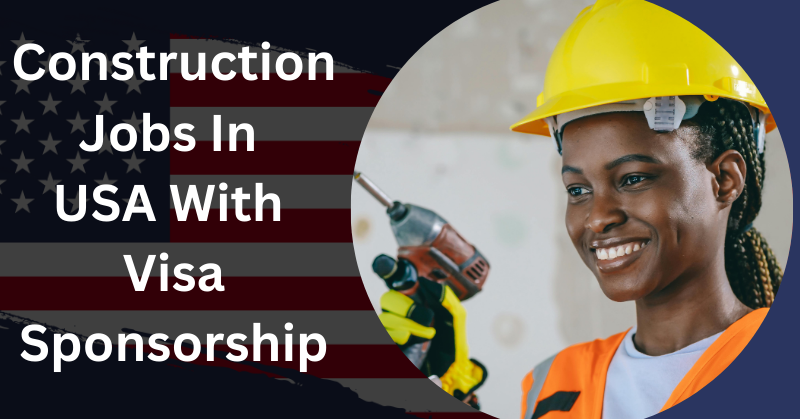Did you know that the US construction industry is facing a significant labor shortage, with some estimates indicating hundreds of thousands of unfilled positions?
Imagine skilled tradespeople from around the world, like Carlos, a master carpenter from Mexico, finding rewarding careers in the US, thanks to visa sponsorship.
His story isn’t an anomaly; it reflects the growing need for qualified workers in the American construction sector. The demand is high, and companies are actively seeking talent globally.
However, navigating the US immigration system can be a major hurdle. This article focuses specifically on construction jobs in USA with visa sponsorship, providing essential information for international skilled workers. We will explore the opportunities available, the challenges employers face, and the critical role of visa sponsorship in this process. For many, this sponsorship is the gateway to work in USA and contribute to building America’s future. The shortage of skilled labor has created a unique opening for foreign workers to find construction jobs in USA, and visa sponsorship makes that a reality.
Types of Construction Jobs In USA With Visa Sponsorship
The US construction industry offers a wide range of opportunities for skilled workers. From foundational work to finishing touches, there’s a place for various talents.
Skilled trades: skill trades are in high demand. Carpenters, electricians, plumbers, and welders are consistently needed. Specialized skills and certifications enhance your marketability. The demand for these trades is consistently high across the United States.
Heavy equipment operators: heavy equipment operators play a crucial role. Operating bulldozers, cranes, and excavators requires experience and certifications. Safety is paramount.
Construction laborers: construction laborers form the backbone of many projects. They perform essential tasks, and their roles are vital. These jobs are physically demanding, and strict safety protocols are followed.
Project managers: project managers and supervisors and supervisors are essential for project completion. Leadership, communication, and organizational skills are vital. Experienced professionals are highly valued.
Specialized roles: specialized construction roles exist in areas like bridge building, tunnel construction, and high-rise construction. These projects require unique skills and experience.
Regional demand varies. Areas experiencing rapid growth, like Texas, Florida, and parts of California, have a high demand for construction workers. Urban centers also require a constant influx of skilled labor.
In summary, whether you’re a skilled tradesperson, an equipment operator, or a project manager, the US construction industry offers diverse opportunities. Understanding the regional demands and the specific skills required will help you find the right fit.
Benefits of Construction Jobs In USA With Visa Sponsorship
Working in the US construction industry offers more than just a job; it’s a pathway to significant career growth.
Career advancement: career advancement is a real possibility. With experience and dedication, you can move into leadership roles like foreman, supervisor, or project manager. Specialized training and certifications can further enhance your career prospects.
Skill development: skill development is another significant benefit. The industry provides ample opportunities to gain valuable construction skills and experience. Staying updated with the latest technologies and techniques is essential. Certifications and continuing education are highly valued, improving your marketability and earning potential.
Cultural exchange: this is a unique aspect of working in the US. You’ll have the opportunity to experience American culture firsthand. Working on diverse construction projects allows you to interact with people from various backgrounds, enriching your personal and professional life.
Long-term residency opportunities: longterm residency opportunities exist, primarily through the EB-3 visa. This visa category is specifically designed for skilled workers, professionals, and other workers. It offers a pathway to permanent residency (Green Card), allowing you to build a long-term future in the US. The process requires employer sponsorship and labor certification.
Contributing to US infrastructure: this is a deeply rewarding aspect of construction work. You’ll play a vital role in building and maintaining the nation’s roads, bridges, buildings, and other essential structures. Your work will directly impact the lives of millions of Americans.
The US construction industry is constantly evolving, offering opportunities for innovation and growth. Embracing new technologies and sustainable practices can lead to exciting career paths. The demand for skilled workers ensures job security and competitive wages.
Salaries in the US construction industry vary significantly, influenced by several factors. Experience, skill level, and certifications play a crucial role. Specialized skills, such as welding or advanced electrical work, command higher pay. Location also impacts earnings, with urban areas and regions with high demand generally offering better compensation.
Average salary ranges differ per job type. Construction laborers typically earn less than skilled tradespeople. Carpenters, electricians, and plumbers can expect higher wages, particularly with experience and certifications. Project managers and supervisors, due to their responsibilities, often earn the highest salaries. Heavy equipment operators fall within a mid-range, with specialized operators earning more.
Benefits packages are another essential component of compensation. Many employers offer health insurance, retirement plans, and paid time off. Some may also provide tuition reimbursement or apprenticeship programs. These benefits can significantly impact overall earnings.
Regional salary differences are notable. Areas with a high cost of living, such as California and New York, tend to offer higher wages to attract and retain workers. Similarly, regions experiencing rapid growth, like Texas and Florida, may also offer competitive salaries. Rural areas may have lower wages due to lower living costs and demand.
Finding construction jobs in USA with visa sponsorship requires a strategic and persistent approach. Online job boards are a valuable starting point. Websites dedicated to construction and international recruitment can yield promising leads. Use specific keywords like “visa sponsorship” and filter your searches accordingly.
Directly exploring construction company websites is also essential. Many large construction firms actively seek international talent and may have dedicated sections for international applicants. Research companies in areas with high demand.
Recruitment Agencies: specializing in international placements can streamline your job search. They handle the complexities of visa sponsorship and connect you with reputable employers. However, choose reputable agencies and be wary of those that demand upfront fees.
Industry associations: industry associations such as the Associated General Contractors of America (AGC), can be valuable resources. They often have job boards and networking opportunities. Joining relevant associations can increase your visibility.
Networking and Trade Shows: networking and attending trade shows are crucial for building connections. Trade shows and industry events allow you to meet potential employers and learn about job opportunities. Building a professional network can significantly enhance your chances of finding sponsorship.
Avoiding scams is paramount. Be cautious of job offers that seem too good to be true. Verify the legitimacy of the company and never share sensitive information without confirming the employer’s credibility. Visa scams are prevalent, so remain vigilant.
The interview and selection process may involve multiple stages. Expect background checks and skill assessments. Employers need to ensure you meet their requirements and comply with US regulations.
Credential and certification verification is a critical step. Your foreign credentials and certifications must be evaluated for US equivalency. Organizations like World Education Services (WES) can assist with this process. This step ensures your qualifications are recognized in the US construction industry.
Remember, finding a construction job in USA that offers visa sponsorship requires patience and persistence. Be prepared to invest time and effort in your job search and application process. Building a strong professional profile and networking effectively will increase your chances of success.
Visa Options Available for Construction Jobs in USA with Visa Sponsorship
Navigating US visa options is crucial for international construction workers. The right visa can make all the difference in securing a job and building a career.
The H-2B visa: this is a common pathway for temporary non-agricultural workers, including many construction roles. This visa allows US employers to bring foreign workers to fill temporary non-agricultural jobs. It’s often used for seasonal construction projects or when there’s a temporary labor shortage. Requirements include employer sponsorship and labor certification from the Department of Labor. However, the H-2B visa is subject to annual quotas, and the process can be complex.
The EB-3 visa: the EB-3 visa is an employment-based Green Card, offering a path to permanent residency. It’s designed for skilled workers, professionals, and other workers. This visa category requires employer sponsorship and labor certification through the PERM process. The EB-3 visa offers long-term stability and the opportunity to build a life in the US. However, it involves a lengthy process and stringent requirements.
Other potential visas may include the H-1B visa for specialized roles, though it’s less common in construction. The H-1B is typically reserved for jobs requiring a bachelor’s degree or higher in a specialized field. The J-1 visa, or Exchange Visitor visa, is generally not applicable for standard construction positions.
Comparing these visa options, the H-2B is suitable for temporary work but has quotas. The EB-3 offers permanent residency but requires extensive documentation and a lengthy process. The H-1B is limited to specialized roles, and the J-1 is generally not applicable.
Common misconceptions about visa sponsorship in construction are prevalent. Many believe it’s impossible to obtain a visa for construction work. This is untrue; while challenging, it’s achievable with the right employer and qualifications. Another misconception is that all visas lead to permanent residency. This is false. Each visa has specific terms and conditions.
Understanding the specific requirements and limitations of each visa is critical. The H-2B visa is for temporary work, while the EB-3 is for permanent residency. The process requires diligent preparation and adherence to US immigration laws.
Average Salary of Construction Jobs in USA – Work in USA
Salaries in the US construction industry are influenced by several key factors. Experience, skill level, and certifications play a significant role. Specialized skills, such as advanced welding or electrical work, command higher pay. Additionally, the location of the job greatly impacts earning potential.
Average salary ranges vary considerably depending on the job type. Construction laborers typically earn less than skilled tradespeople. Carpenters, electricians, and plumbers can expect higher wages, especially with experience and certifications. Project managers and supervisors, due to their extensive responsibilities, often earn the highest salaries. Heavy equipment operators fall within a mid-range, with specialized operators earning more.
To provide a general overview, here are some average salary ranges for common construction jobs in the USA:
- Construction Laborer: $30,000 – $45,000 per year
- Carpenter: $40,000 – $60,000 per year
- Electrician: $50,000 – $75,000 per year
- Plumber: $50,000 – $80,000 per year
- Heavy Equipment Operator: $45,000 – $70,000 per year
- Project Manager: $70,000 – $120,000+ per year
These ranges are approximate and can vary based on the factors mentioned earlier.
Benefits packages are a crucial component of overall compensation. Many employers offer health insurance, retirement plans, and paid time off. Some may also provide tuition reimbursement or apprenticeship programs. These benefits can add significant value to your total earnings.
In addition to base salary, many construction companies offer comprehensive benefits packages, including:
- Health insurance (medical, dental, vision)
- Retirement plans (401(k) or similar)
- Paid time off (vacation, sick leave)
- Life insurance and disability coverage
- Opportunities for overtime pay
- Training and apprenticeship programs
Regional salary differences are notable. Areas with a high cost of living, such as California and New York, tend to offer higher wages to attract skilled workers. Similarly, regions experiencing rapid growth, like Texas and Florida, may offer competitive salaries. Rural areas may have lower wages due to lower living costs and demand.
Top Construction Companies Offering Construction Jobs in USA with Visa Sponsorship
Finding construction jobs in USA with visa sponsorship often involves targeting companies that are experienced in international hiring. Here’s a look at different types of companies and how to research them.
Large national companies: these are often your best bet. These companies have the resources and experience to handle visa sponsorship. They frequently work on large-scale projects and have a constant need for skilled labor. Some examples include Bechtel, Fluor Corporation, and Turner Construction. These companies often have dedicated international recruitment teams.
Regional companies: the regional companies also offer opportunities. These companies focus on specific geographic areas and may have strong relationships with local labor unions. They often have a steady stream of projects and may be more flexible in their hiring practices. Research companies that are currently experiencing growth or have a large number of upcoming projects.
Specialized companies: specialized construction companies focus on niche areas of construction, such as bridge building, tunnel construction, or high-rise development. These companies require highly skilled workers and may be more willing to sponsor visas for specialized talent. Researching these companies requires identifying your specific skill set and finding companies that align with your expertise.
Researching these companies effectively is crucial. Start by visiting their websites. Look for career sections and international recruitment information. Check job boards and professional networking sites. Read company reviews and news articles to understand their reputation and project history. Contact industry associations for company recommendations.
When researching, look for companies that:
- Have a history of sponsoring visas.
- Offer competitive salaries and benefits.
- Have a strong safety record.
- Provide opportunities for career advancement.
- Are financially stable and have a pipeline of projects.
Living Conditions for Foreign ConstructionJob Workers in USA – Work in USA
Understanding the living and working conditions is crucial for international workers considering construction jobs in USA. Salary and benefits vary significantly. As previously discussed, factors like experience, location, and skill level influence pay. Many employers offer comprehensive benefits packages, including health insurance, retirement plans, and paid time off. It’s 1 essential to clarify these benefits during the job offer stage.
Working hours and conditions can be demanding. Construction work often involves long hours, especially during peak seasons. Outdoor work is common, exposing workers to various weather conditions. Safety is paramount, and employers are required to provide safety training and equipment. Understanding and adhering to safety protocols is crucial.
Housing and accommodation can vary widely. In urban areas, housing can be expensive, while rural areas may offer more affordable options. Some employers may provide assistance with housing or offer temporary accommodation for new hires. It’s essential to research housing options in your job location.
Cultural adjustment is a significant aspect of working in the USA. The US has a diverse culture, and adapting to new social norms and customs can take time. Learning about American culture and customs can ease the transition. Building a support network is helpful.
Community resources are available to assist international workers. Many communities offer language classes, cultural orientation programs, and support groups. These resources can help you integrate into your new environment and build a sense of community. Utilizing these resources can make the transition smoother.
Conclusion
In summary, the US construction industry presents significant opportunities for skilled international workers. With the right visa, such as the H-2B or EB-3, and by targeting reputable companies, you can build a successful career. Remember, thorough research, networking, and understanding the visa process are key. Don’t let the complexities deter you. Your skills are in demand, and the US offers a chance to contribute to its growing infrastructure.


